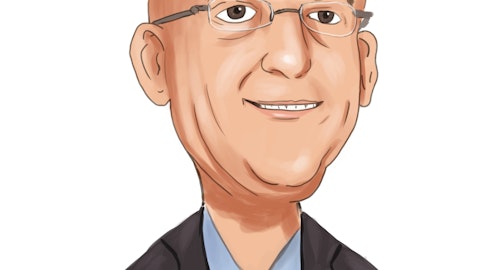Ed Woo: Great. Well, thanks for answering my question.
Operator: Your next question comes from the line of Brian Kinstlinger with Alliance Global Partners. Your line is now open.
Unidentified Analyst: This is Shervin on for Brian. Thanks for taking my question. You gave good detail on the pipeline. Could you talk about maybe the average deal size in the Shield pipeline? And do you think maybe from a timeline visibility standpoint, the next few deals, will they be in the first half? You think can maybe bring them over the finish line within the next two three months. That would be great. Thanks.
Tony Scott: Well, our plan is to land every deal we can. I would say the averages don’t mean that much at this particular point because frankly, they’ve been all over the map, and I don’t see a specific trend at this particular point. What I do see is some of the bigger deals that are in the pipeline, the customers want to do kind of a smaller trial to get started. And then once they’ve successfully completed that proof-of-value than are opening the discussion with us in terms of bigger, broader sorts of deployment. So, at this point, I don’t read a lot into those averages or those numbers because they’re just too small a number to be statistically meaningful, if you will, but I am encouraged by the trend.
Unidentified Analyst: Great. Thanks. That’s all I have.
Operator: Your next question comes from the line of Aaron Warwick with Breakout Investors. Your line is now open.
Aaron Warwick: Hey, good afternoon. Thanks for taking the call. Just wanted to probe a little bit on the Carahsoft partnership that you guys recently announced. My understanding is they’re highly respected organization in the D.C. area. And just sort of what’s the plan and the opportunity with them, when might we see you bearing some fruit from that partnership?
Tony Scott: Yes, I think Carahsoft was a key partner for us. When I was federal CIO, I paid a lot of attention to who our innovative partners were and the federal government obviously buys a lot of technology. The perception is that a lot of it is with really large federal system integrators. But increasingly, even when I was there four or five years ago, Carahsoft was the kind of scrappy innovative company that was doing some of the more interesting deals with the federal government. They had gotten themselves on to all of the major contract vehicles. They were quite clever in terms of figuring out how to combine pieces of things together to create a solution that a specific customer wanted. They had a reputation for great customer service and interaction.
And so when I got here, it was one of the first conversations we wanted to go have and I only wish we’d gotten it started and forgotten it, landed a little sooner than we did. But I think in the long run, they’re going to be a great partner for us in the markets that they serve. In terms of momentum, you know the federal cycle, it takes a long time to get going and then once you get going, then it’s interesting for a really long time. And so I don’t think we’re going to see a change in that pattern from Carahsoft. This is more of a mid to long-term bet, but one that I think will be meaningful for our commercial products. They’re not representing us on the traditional federal consulting contracts that we have, this is all about our commercial products, Shield and so on.
Aaron Warwick: Right. Right. Thank you. Appreciate that. And then one that caught me by surprise was the Shield Mobile. I don’t recall you having spoken about that before. I just wondered kind of what — if you could talk a little bit more about what the plan is with that and what the opportunities you see there?

